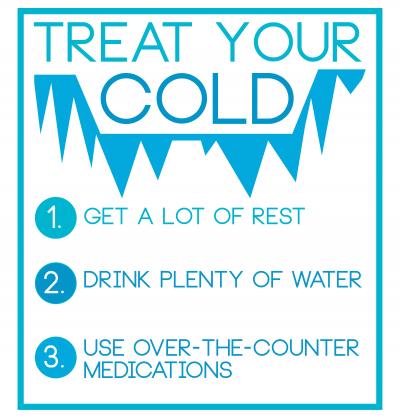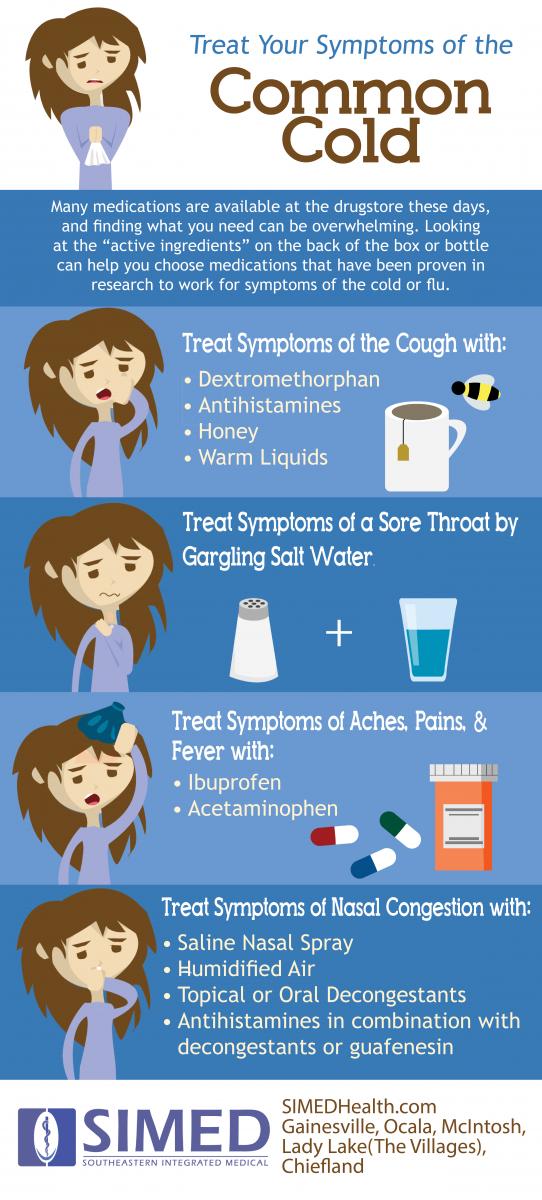
As we approach winter, you might have noticed people coming down with the common cold. You might even experience symptoms like a cough, sore throat, or runny nose. Even if you don’t have a cold yet, it doesn’t hurt to be prepared.
We talked with Colleen Crabbe, a SIMED Primary Care ARNP in Gainesville, about what a cold is and how you can treat the symptoms.
Symptoms of the Common Cold
The symptoms of a cold include:
- Runny nose
- Cough
- Congestion
- Sore throat
- Headache
- Malaise
If you have these symptoms, you probably have a cold, but you might also have the flu.
Flu VS. Cold: What’s the difference?
It can be tough to differentiate the common cold from the flu because both have similar symptoms like cough, runny nose, congestion, headache, sore throat, and malaise (ill feeling). Flu symptoms, however, tend to be more severe and likely to cause fever and body aches.
Three Basic Elements to Treating the Common Cold
You’ve figured out you have the common cold. Now what?
1. Get rest
2. Drink plenty of water
3. Use over-the-counter medicine
These are the best things you can do if you have the common cold.
Medications: What Should You Look For?
There are many choices of medications at the drugstore these days, and finding what you need can be overwhelming. Looking at the “active ingredients” on the back of the box or bottle can help you choose medications that have been proven in research to work for symptoms of the common cold and flu.
- Treating the Cough with Dextromethorphan.
- This ingredient can help reduce your cough. It is found either alone or in combination, liquid, or pill formulations.
- Dextromethorphan won’t make you drowsy like prescription cough medicine can.
- Reducing Fever and Aches with Analgesics
- Analgesics like Acetaminophen and ibuprofen can help with reducing fever and aches.
- Acetaminophen tends to have fewer side effects, but both have risks to those with certain conditions. Discuss the use of these medications with your physician prior to use.
- Relieving Congestion with Decongestions
- Decongestions are commonly used and commonly feared over-the-counter medicines.
- Pseudoephedrine is more effective and can be found behind the counter where you will need to show your identification.
- Phenylephrine is not as effective as pseudoephedrine and is found in many over-the-counter cold medications.
- Both pseudoephedrine and phenylephrine can help with symptoms of cough, congestion, ear pressure, and pain. Use them with caution if you have high blood pressure or heart conditions.
- Make sure to check your active ingredients to see whether the medication has pseudoephedrine or phenylephrine.
- Topical formulations in sprays such as Afrin or generics can improve nasal congestion, but should be used a maximum of twice a day for 3 days.
- Improving Sleep with Antihistamines
- Common antihistamines like Benadryl (diphenhydramine) and chlorpheniramine or doxylamine are found in many nighttime cold medicines and sleep aids.
- The medications help with drying and can sooth congestion, runny nose, and cough while sedating to improve sleep.
- There is some evidence that using antihistamines with decongestants is more effective for moderate to severe cold symptoms.
- Reducing Mucus and Cough with Guaifenesin
- Guaifenesin is a popular expectorant in Robitussin and Mucinex products and can also be used by itself. It helps with coughing and thinning of mucus.
- Reducing Congestion and Cough with Saline Sprays
- Saline sprays irrigate the nostrils during a cold and can provide relief of congestion and cough in combination with other therapies.
- Other Possible Remedies Include:
- Vitamin C, Vitamin D, Echinacea, zinc, and heated humidity have limited evidence for improvement in cold symptoms and need more research.
Medications and Home Remedies for Cold Symptoms
Here is a summary of different treatments that will work for each of the common cold symptoms.
Cough:
- Dextromethorphan
- Antihistamines
- Honey
- Warm Liquids
Sore Throat:
- Salt-water gargles
Aches, Pains, and Fever:
- Acetaminophen
- Ibuprofen
Nasal Congestion:
- Saline nasal spray
- Humidified air
- Topical or oral decongestants
- Antihistamines in combination with
- Decongestants
- Guaifenesin
If these treatments aren’t working and you feel your symptoms worsening, you might want to consider the next step.
When You Should See a Doctor
For most people with colds, symptoms are self-limited, meaning they will go away on their own eventually. Because the cold is caused by a virus, antibiotics will not help, but some people can have complications from the cold like acute sinusitis, pneumonia, bronchitis, and ear infection. These complications may need additional prescription medicines from your provider or even antibiotics depending on the patient.
You should see a doctor if you:
- Develop significant face pain
- Have symptoms prolonged over one week
- Experience shortness of breath
- Wheeze
- Have another unmanageable symptom
Those who are most at risk of these complications are diabetics, smokers, and those with poor immune systems.
Avoid Transferring the Cold
Colds can spread quickly amongst family, friends, and people in a work place. Take these steps to ensure you avoid giving and getting a cold:
- Wash your hands often
- Cover your coughs and sneezes
- Avoid others until you feel better
Following those tips, you will be able to reduce the spread of the cold virus. If you have a fever or an uncontrollable cough and sneezing, you should consider staying home from school or work to help reduce the spread of the cold.
To schedule an appointment with Colleen Crabbe, ARNP, in Gainesville, call (352) 332-7770 or schedule an appointment online.
For SIMED Primary Care in Gainesville, Ocala, Chiefland, Lady Lake, or McIntosh, call (352) 224-2225 or request an appointment online. If you could like to schedule an urgent care appointment for cold or flu symptoms, call (352) 373-2340 or request an appointment online.
If you have the flu or a cold, we hope you feel better.
Follow us on Facebook and Twitter for more relevant articles.
